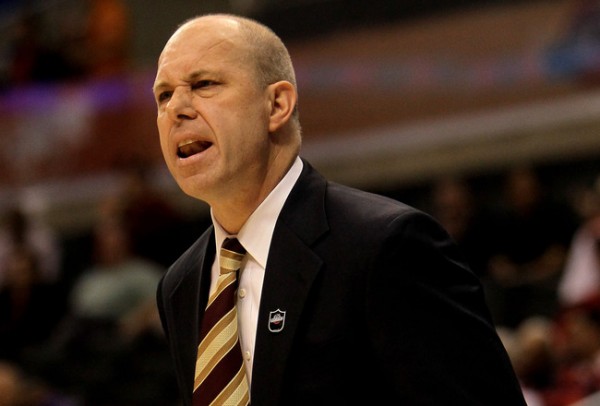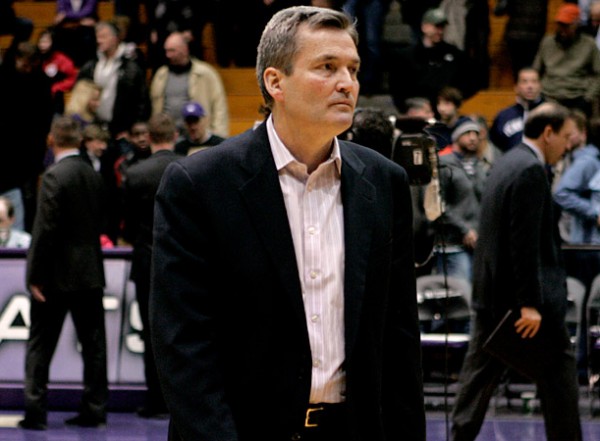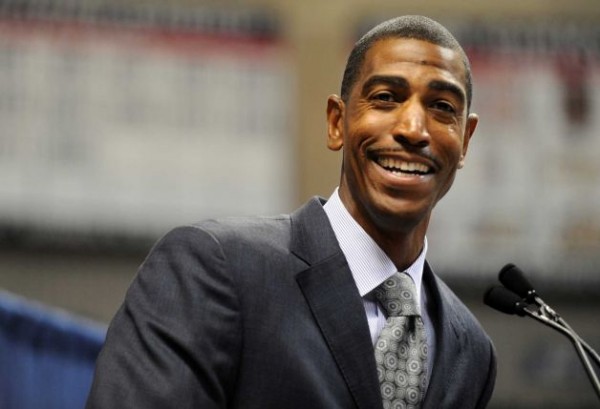Highlighting Six Power Conference Coaches Feeling the Heat This Season
Posted by Chris Johnson on November 1st, 2012 Chris Johnson is an RTC Columnist. He can be reached @ChrisDJohnsonn.
Chris Johnson is an RTC Columnist. He can be reached @ChrisDJohnsonn.
Expiration dates on coaching tenures vary based on a variety of different factors. Signs of positive momentum and progressive change no doubt correlate positively long coaching tenures, but there are other elements involved: Program expectations, buyout fees, revenue accumulation, recruiting success, and so on. The checklist differs at each program, which makes nailing down a hard-and-fast list of general standards practically impossible. Despite the vague criteria that define the profession, and the fundamental truth that administrators – not fans, players or boosters – make the final call on coaches’ job statuses, we enter every college basketball season with a pretty good idea of where each coach stands in his current state of employment. Perhaps the most obvious trend, the one most easily spotted across a wide sample of coaches, is the fateful decline. Win totals plummet, fan support wanes, administrators stay mum while perusing the market for a replacement – then, the rumors, the denial, the wait and, last but not least, the long-expected press release signaling the end of a coach’s time at the program. Pretty boilerplate stuff. The path to the dreaded fall is fairly predictable. What follows are six coaches (one from each of the power conferences) feeling the heat this season. All of them may or may not last the year, but there’s a decent chance at least one of these guys will get the axe by next April. To quantify this hot seat breakdown, I’ve added a meter that gauges a coaches’ “heat level” on a 1-through-5 scale. I wish these coaches well, but their inclusion here is not a positive way to begin the season.
Herb Sendek (Arizona State)
Heat Meter: 4

Unless Sendek leads a major renaissance in Tempe this season, he could find himself out of a job (photo credit: Getty Images).
In most years, finishing with a 6-12 record in the Pac-12 is not a terrible result. Winning in league play is difficult, and winning in one of the nation’s better high-major conferences is even more difficult. Notching six wins won’t get you into NCAA Tournament (or even NIT) consideration, but it’s hardly a death sentence, either. The problem with this line of thinking is that last season’s Pac-12 was not the usual Pac-12. It was awful – so bad that regular season champion Washington didn’t qualify for an at-large bid. Considering the league’s top-to-bottom futility last season, managing just six wins is proof enough to raise serious questions about the direction of Arizona State’s program. Now Sendek finds himself at a crossroads: after last year’s disappointment, two of his best assistants left the program, including one, Lamont Smith, who joined Lorenzo Romar’s Staff at Washington. When you’re losing your top assistants to league competitors, job security develops a tenuous, even artificial, feel. Sendek can save his position if the Sun Devils show noticeable signs of improvement, and with highly-touted recruit Jahii Carson eligible this season, that’s a reasonable expectation to have. Another six-win league total – and this year, six Pac-12 wins won’t be as easy to come by – is a doomsday scenario.
Andy Kennedy (Ole Miss)
Heat Meter: 2
Contract extensions aren’t the legal binding forces of will they used to be. Nowadays, they are more like official votes of confidence, only in document form. The standards vary, of course, but unless your Rick Pitino or Bill Self or Mike Krzyzewski or any other blueblood coaching titan I’ve failed to mention, your job status is subject to constant evaluation. Which brings me to Kennedy, and the two-year contract extension he received last season. The Rebels won 20 games last year, and hovered in and out of most “Last Four Out” – “Last Four In” bracket projections until Selection Sunday. They posted an 8-8 conference record, with notable wins over Arkansas (twice), Alabama and Tennessee. The word notable probably doesn’t fit in that context, but it’s arguably the best way to exalt some the Rebels’ more favorable results from the rest of the mediocre muck that characterized last season. Mediocrity does not necessarily breed coaching dismissals, but in Kennedy’s case, his status is far from secure. Ole Miss hasn’t breached the field of 68 during his tenure, and patience is wearing thin. It’s not quite Tournament-or-bust for Kennedy just yet, but he needs to show he’s taking major steps toward improvement. Kennedy welcomes in an impressive five-member recruiting class this season, including junior college player of the year Marshall Henderson. So even if the Rebels’ don’t find themselves on the right side of the bubble cut line, letting Kennedy finish out his contract before making a decision is a plausible scenario.
Bill Carmody (Northwestern)
Heat meter: 3

Reaching the NCAA Tournament would secure Carmody’s job status going forward (Photo credit: US Presswire).
The streak continues, 74 and counting, the ignominious stain of a nearly three-quarters of a century-long NCAA Tournament drought. The Wildcats nearly cracked the bubble last season, only to see their postseason resume sullied with a string of critical losses near the end of Big Ten play. Northwestern’s harsh reality puts a constant drag on the program’s yearly basketball excitement, but the fact Carmody’s job status is being mentioned in these negative terms is a win unto itself. Now that the Wildcats have shown they can challenge Big Ten competition, there are real expectations – ones that Carmody needs to meet in order to save his job. Losing John Shurna, the Big Ten’s leading scorer at 20.0 PPG last season, is a blow, but the Wildcats have most of last year’s rotation, along with a host of newly eligible transfers and big men entering the fold, this year. If coached, channeled, directed, and grounded in the complexities of Carmody’s Princeton offense, this is a Tournament-level team. Whether or not Carmody needs to reach that threshold to save his job is up for debate. What’s clear is that Northwestern, for the first time in its basketball history, has realistic designs on postseason relevance. Carmody deserves a great deal of credit for that attitude change. Capping his tenure with an at-large bid, and thus ending the Wildcats’ unique mark of infamy, is the next step.
Jeff Bzdelik (Wake Forest)
Heat Meter: 4
In a vacuum, Bzdelik’s first two years at Wake Forest are not firing-worthy offenses. Since taking over in 2010, the former Colorado coach has overseen minimal improvements. After an eight-win campaign in Bzdelik’s first year on the job, the Deacs pushed that number to 13 (four of them in ACC play) last season. A five-win improvement is nothing groundbreaking, but it represents progress if nothing else. Baby steps. Still, compared to the levels of success and national spotlight former coach Dino Gaudio generated before him, and the fact Gaudio was let go after leading the Deacs to a 44-18 record over his last two seasons and a No. 1 ranking in January 2009, Bzdelik is moving at a glacial pace. He probably needs more than a five-win jump to save his job; a middle-of-the-pack ACC finish feels like a logical measuring stick for Bzdelik’s defining season in Winston-Salem. Maybe he needs more. At this point, given the short leash Gaudio was afforded, and the brief national success he orchestrated, it’s hard to imagine Bzdelik surviving the year unless he establishes a level of competitive drive unseen during the first two years of his tenure. In other words, he needs to make Wake Forest competitive against ACC teams on a nightly basis. For the past two seasons, that hasn’t been the case. The bad news: Wake Forest counts nine freshmen and only two seniors on its roster this season. Youth isn’t always a bad thing, but Wake’s green roster complexion will only increase the developmental and maturation processes Bzdelik faces this season – adding to the immense pressure he already faces to produce a significant uptick in the Deacs’ win total.
Kevin Ollie (UConn)
Heat meter: 5
Taking Ollie here seems like foul play. Rookie head coaches typically get more than one season to install their systems, make headway on the recruiting trail and ease the often rocky transition process. Ollie doesn’t have that kind of leeway. He needs to implement appreciable change right away. As a point of fact, he only has five months to show AD Warde Manuel he’s best suited for the inherently daunting task of succeeding the legendary Jim Calhoun. Thrust into an incredibly difficult situation following Calhoun’s retirement this offseason, Ollie must overcome a host of challenges – the transfers of forwards Roscoe Smith and Alex Oriakhi, postseason ineligibility, a depleted roster, the unwieldy recruiting hindrance posed by his one-season tenure – to lead a youthful and inexperienced roster into a respectable Big East finish. In the end, Ollie won’t be judged solely on wins and losses. His situation is an atypical one – not just in the abrupt manner he rose to his current post, but in the way the NCAA’s APR-related postseason ban could ultimately sap his players’ will to win. For Ollie, the grading scale is abbreviated but daunting. It’s about how he manages the extremely high bar Calhoun set during his long tenure at the school, how he seeks to inspire a group of players without any Tournament incentive. Ollie’s hot seat is unlike the others on this list, but it flames on all the same.
Travis Ford (Oklahoma State)
Heat meter: 4
Landing a top-five recruit affords a certain level of anticipation, and with it, pressure. When the immediate results don’t add up – when the super-hyped prospect (in this case, swingman Le’Bryan Nash) doesn’t morph into a dominant player the moment he steps on campus – disappointment is inevitable. And disappointment breeds self-evaluation, a process Ford finds himself party to as the Cowboys enter 2012-13 having missed the NCAA Tournament two years in a row after making the field in 10 out of the previous 12 seasons. The Cowboys look poised to end the mini-drought this season, though the sudden family-related transfer of guard Cezar Guerrero could hurt their chances. Fortunately, Ford sealed another blue-chipper in the 2012 class in Marcus Smart, and all dispatches out of Stillwater point to Smart having a massive debut season. If that’s the case, if Smart can ignite a young roster and develop a strong rapport with Nash and senior JP Olukemi, then Oklahoma State should return to familiar NCAA territory and Ford will live to see another season. There is more than enough talent on this roster to secure a spot in this year’s bracket, even in a loaded Big 12 that features at least seven teams with legitimate Tournament aspirations. Ford needs to mold that talent into a coherent unit, something more than the disparate group he guided last season. And let’s be real: With arguably two of the nation’s top 25 players on your roster, not making the tourney is downright unacceptable.














































A 5 win improvement would not only get Bzdelik another year, but it would likely get him an extension (not that that would mean much). It’s also pretty unlikely. 13 or fewer wins and he’s gone. 13-15 wins, and it’s 50/50. 16-17 wins he gets year 4. 18+ wins he gets an extension. Ron Wellman was delusional when he hired Jeff Bzdelik, and he remains delusional (and ignorant about sunk costs).